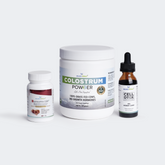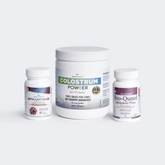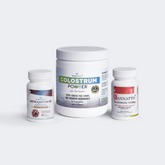How to Tell If Your Eggs Are Bad: Easy Tests You Can Do at Home
Estimated Reading Time: 7 minutes
|So, you pulled out a carton of eggs from the back of the fridge and wondered, "Are these eggs still good?" We’re sure this scenario is common to many.
Eggs are found in most kitchens but figuring out if they're still safe to eat can be tricky for many. No one wants to waste food, but eating a bad egg can lead to stomach problems you don’t need.
In this blog, we'll discuss three easy and reliable ways to test the freshness of eggs at home. Once you go through this, you’ll know whether it’s time to toss them or use them. Also, find some essential storage tips to keep your eggs fresh for longer.
How to Read and Understand Egg Expiration Labels?
Before learning about the tips to know if your eggs are bad, it’ll be good to know a bit about expiration dates mentioned on the labels.
You may see a few different date labels on egg cartons, like: Best By, Use By, or Sell By. These dates can be confusing for you, but here’s what you should know; they don’t mean the eggs are instantly bad after that day.
Sell By: The date stores use to manage inventory, not an expiration date. Eggs are still good for weeks after this date.
Best By/Use By: The manufacturer’s estimate for peak quality, not a safety date, though.
The USDA (United States Department of Agriculture) says eggs are generally safe to eat for 3–5 weeks after purchase if stored properly. Proper refrigeration can really make a big difference. If you store eggs below 40°F, they’re likely to last longer than the printed date. Still, dates alone aren't foolproof, so you need simple tests to check if your eggs are good or bad.
IMPORTANT NOTE: Never taste an egg to test freshness. If anything looks or smells bad, discard the egg and clean surfaces right away to avoid contamination.
What Are the Most Reliable Egg Freshness Tests?
-
A Good Look Test
What To Do?
The very first step to test your egg is to have a good look at it. Check for any cracks or unusual discoloration.
What You May See:
-
A Bad Egg: A crack or slight discoloration could mean you’ve a rotten egg that may be contaminated with bacteria (Salmonella). It’s time to toss it.
-
A Good Egg: The egg is all neat and clean with the shell intact.
NOTE: Maybe the egg with cracks or color change is still good to eat. To confirm, you need to do test numbers 3 or 4.
Also Read: 11 Dairy-Free Protein Shakes
-
The Float Test
What To Do?
-
Fill a bowl big enough for egg with cold water.
-
Now, gently place your egg in the water.
-
Observe whether your egg floats or sinks.
What You’ll See:
-
A fresh egg: Sinks and lies flat on the bottom of the container.
-
Slightly older (still safe): Sinks but stands upright at the bottom.
-
Bad egg: Floats to the top. Do not use the egg.
How It Works:
Eggshells are porous and eggs have an air sac or air pocket inside them. As eggs age, air slowly enters the shell, and moisture and carbon dioxide inside the egg evaporate, causing the air pocket to increase. The extra air makes the egg more buoyant. So, a floating egg is a sign it's time to toss it.
Any Limitations of this test?
Use it as a first step, as this test doesn't show if bacteria have contaminated the egg. After this, you can confirm freshness with the next two methods.
-
Shake Your Egg Test
How To Do It:
-
Hold the egg up to your ear.
-
Shake it gently.
What You Hear:
-
Fresh egg: Almost no sound.
-
Older egg: A sloshing sound or noticeable movement inside.
Why It Happens:
As the egg ages, the whites become thinner, and the yolk can move around more. This test gives a quick idea, but it’s best used with one of the other tests for accuracy.
-
The Crack and Inspect Test
What To Do?
Crack open your egg and inspect it well in two ways (how it looks and how it smells):
What to Look For?
-
Fresh egg: The yolk is round and firm, the whites are thick and stay close to the yolk.
-
Old or bad egg: Watery whites, flat yolk, or any discoloration (pink, green, or black).
How it Smells?
Fresh eggs don’t smell like much. A bad egg? You’ll know that immediately. It will smell sulfuric, or just like something rotten smells. If that’s so, toss it and wash anything it touched.
|
Important Point of Consideration: Even if your egg passes the freshness tests above, you still need to be cautious. If the egg is there for a long time, proper cooking can offer extra protection. Heat effectively kills most harmful bacteria like Salmonella and Listeria, making the egg much safer to consume. |
Also Read: 3 Quick Colostrum Smoothies
Best Storage Tips to Keep Eggs Fresh for Longer
-
Always store them in the refrigerator at 40°F or below to prevent any bacterial growth.
-
Store the eggs in the same carton they came in. This protects them from odors and moisture loss.
-
Avoid keeping them at the door of the fridge. The middle or the back of the fridge is the best option.
-
Store them with the pointed end down. This is to keep the yolk centered and away from the air sac.
-
Avoid washing the eggs before refrigerating. They have a natural coating called bloom that protects them from air and bacteria. If washed, the coating gets removed, making them susceptible to harmful bacteria like Salmonella or Listeria.
-
Avoid temperature changes (like setting eggs out and then refrigerating them).
-
Keep your eggs away from strong-smelling foods as they can absorb odors.
PRO-TIP: Farm-Fresh vs Store-Bought
|
When to Discard the Eggs?
Of course, you don’t want to waste any food, but safety is important. So, it’s best to discard eggs if they are bad. Check for these signs:
-
Egg has a cracked or dirty shell.
-
It smells sulfurous or rotten.
-
It floats in water.
-
You see pink, green, or black spots.
The USDA strongly recommends the principle: When in doubt, throw it out. This is especially important for foods like eggs that may pose a risk if spoiled or improperly handled. Also, this advice stands crucial for pregnant women, older adults, or anyone with a weakened immune system.
NOTE: Don’t just throw a bad egg out. Be sure to clean any surfaces or utensils that came in contact with the egg to prevent cross-contamination.
Summing Things Up
Eggs are a kitchen staple. But they are good only when they’re fresh. And fortunately, it doesn’t take much to find out if yours have gone bad. A simple float test, a quick sniff, or just paying attention to the shell can help you know if your eggs have gone bad.
Taking a few extra seconds to check your eggs before cooking can save your meal and possibly your stomach, too. When it comes to doubtful eggs, it’s just not worth the risk. If something feels wrong, trust your gut and let it go.
Disclaimer: This blog is for informational purposes only and does not provide medical advice. Always consult a healthcare professional before making changes to your diet or health routine. Individual results may vary.
Frequently Asked Questions
Q1. Can I eat eggs past the expiration date?
Yes, if they’ve been refrigerated and pass the freshness tests, they can be safe to consume.
Q2. Is the egg float test accurate?
Egg float test is a quick method to test the freshness of eggs, but it’s not a fully accurate or reliable way to determine whether an egg has gone bad.
Q3. What happens if you eat a bad egg?
Eating a bad egg can pose a risk of food poisoning due to bacteria like Salmonella or E. coli. Symptoms may include:
-
Diarrhea
-
Vomiting
-
Stomach cramps and pain
-
Fever
-
Headache
-
In severe cases, dehydration and blood in the stools
Also Read: Colostrum for IBS Relief
Q4. Can eggs go bad and not smell?
Yes, eggs can go bad without producing a foul smell. Though not common, bacteria like Salmonella can contaminate eggs and make them unsafe to consume.
Q5. What do bad eggs smell like?
A bad egg causes a foul, sulfurous, rotten smell when you crack it open. The strong, pungent smell is due to bacteria that break down the egg contents and produce gases like hydrogen sulfide, which smells like rotten eggs.
Q6. Are older eggs okay for baking?
If they smell fine and pass the float and crack tests, they’re usually okay for baking. Heat helps reduce risk.
Q7. How do I know if farm eggs are fresh without a date?
Use the same tests! If possible, ask the farmer when the eggs were collected.
References:
-
American Egg Board. "Important Food Safety Information." Incredible Egg, 2025, www.incredibleegg.org/egg-handling-storage-tips/.
-
United States Department of Agriculture, Food Safety and Inspection Service. Shell Eggs from Farm to Table. Revised 2021, www.fsis.usda.gov/food-safety/safe-food-handling-and-preparation/eggs/shell-eggs-farm-table.
-
United States Department of Agriculture, Food Safety and Inspection Service. Food Safety: A Need-to-Know Guide for Those at Risk. Revised July 2019, slightly revised March 2025, www.fsis.usda.gov/sites/default/files/media_file/2021-04/at-risk-booklet.pdf.





































